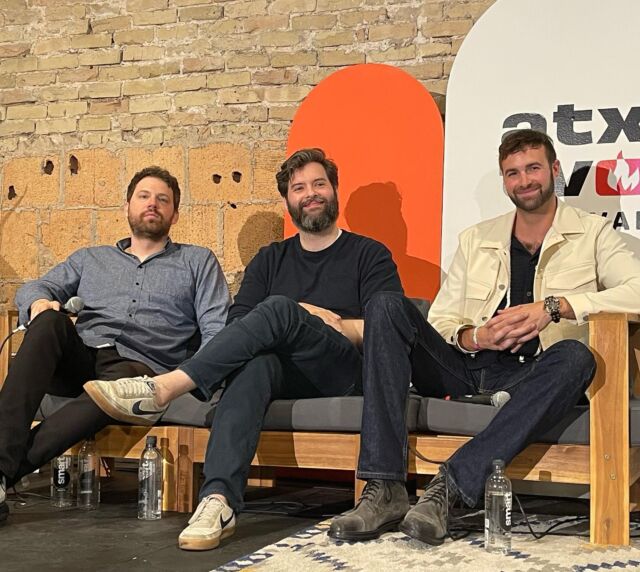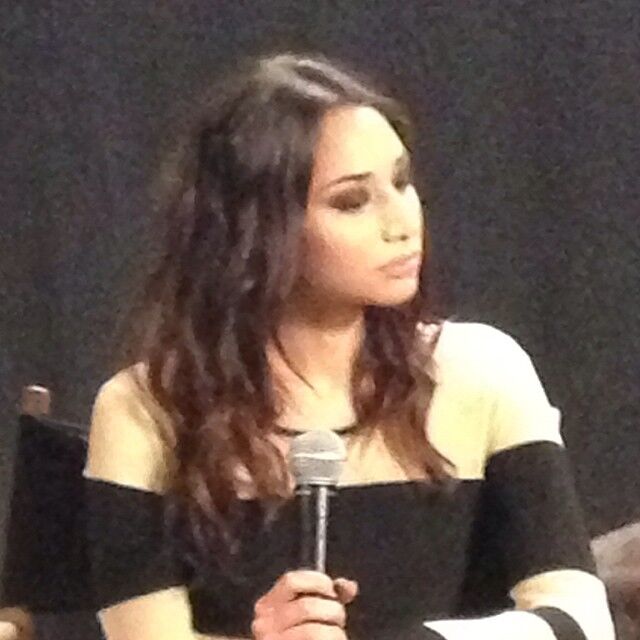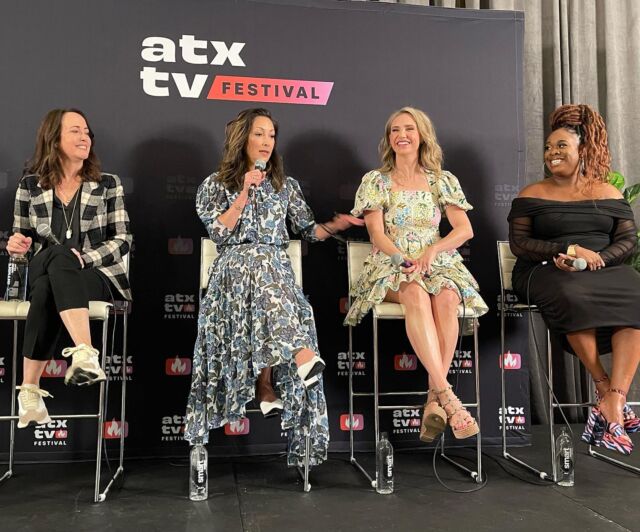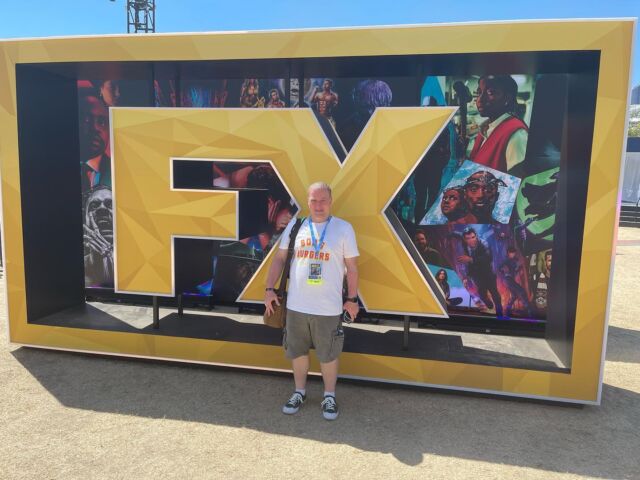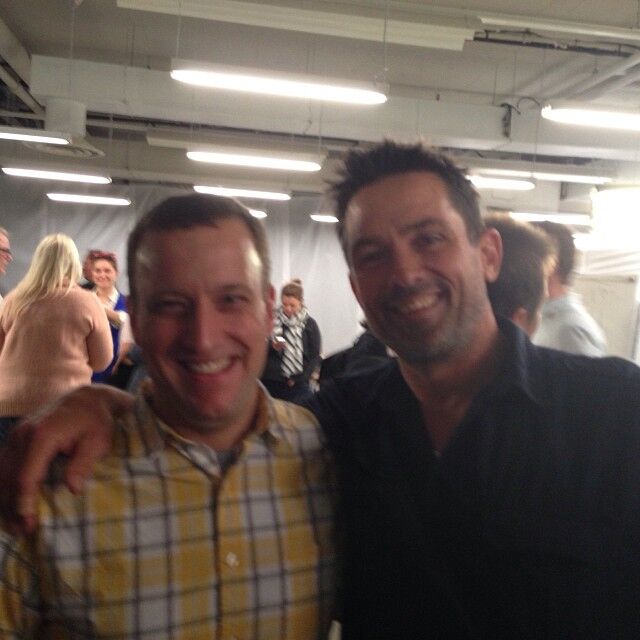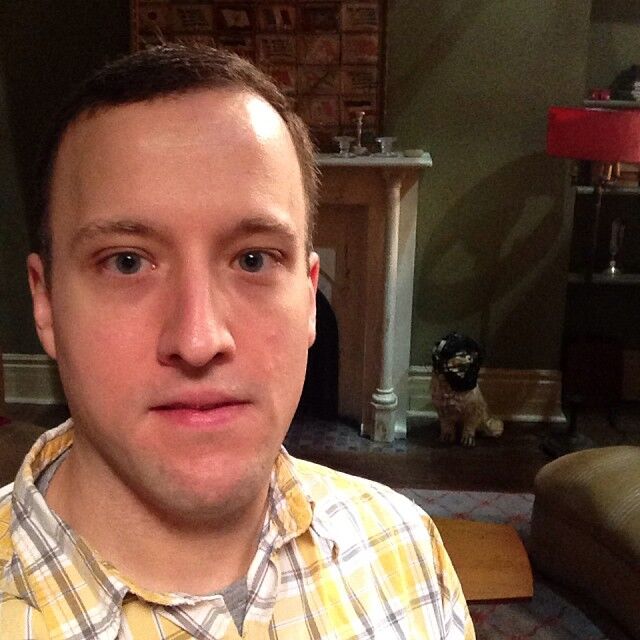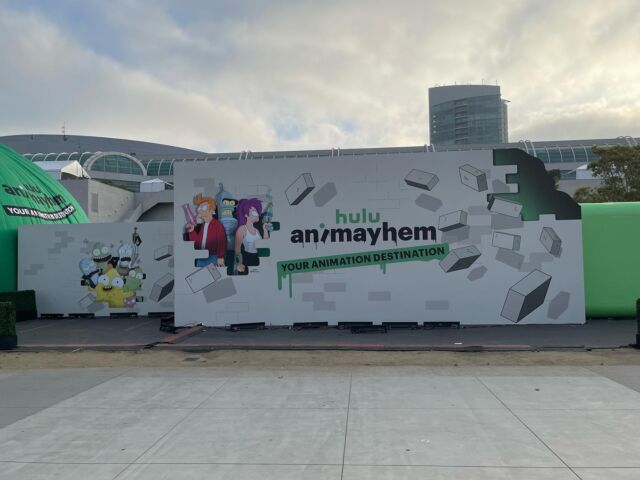This Friday Netflix will launch the new animated series Disenchantment. In the San Diego Comic-Con press room for the series, we got to speak with series creator/executive producer Matt Groening (The Simpsons, Futurama) and executive producer/showrunner Josh Weinstein (The Simpsons, Futurama). Unfortunately there was no video or photos allowed in the session…which was especially difficult when Matt Groening whipped out a notebook full of sketches he had done of all of the show’s characters.
It was easy to see the level of interest and respect that someone like Matt Groening commands. Usually at these roundtables, there is a lot of background noise as folks at the other tables talk while waiting for their turn to interview the talent. However, in this room, you could hear a pin drop—as Matt and Joel were talking with us, the other tables were completely silent, listening in on our conversation.
Below you can find a write-up and audio from the conversation.
From the mind of Matt Groening, comes the 10-episode adult animated comedy fantasy series, Disenchantment, launching on Netflix, August 17, 2018. In Disenchantment, viewers will be whisked away to the crumbling medieval kingdom of Dreamland, where they will follow the misadventures of hard-drinking young princess Bean, her feisty elf companion Elfo, and her personal demon Luci. Along the way, the oddball trio will encounter ogres, sprites, harpies, imps, trolls, walruses, and lots of human fools.
The series will feature the voice talents of Abbi Jacobson (“Bean”), Eric Andre (“Luci”), and Nat Faxon (“Elfo”) along with John DiMaggio, Billy West, Maurice LaMarche, Tress MacNeille, David Herman, Matt Berry, Jeny Batten, Rich Fulcher, Noel Fielding, and Lucy Montgomery.
Matt Groening (Series Creator/EP) & Josh Weinstein (EP/Showrunner)
During the roundtable conversation, I asked about the fact that the new series has a female lead:
 Q: This is the first of your series that has a female lead character. Is that something you specifically set out to do, or it just happened to be that way?
Q: This is the first of your series that has a female lead character. Is that something you specifically set out to do, or it just happened to be that way?
MG: When we first … began scheming, Elfo was the main character, and then we realized no, no, no … we’ve got to make it Bean … because it was more challenging to do. It was different, and in the same way that Futurama was different from The Simpsons, … we wanted to make Disenchantment different from both The Simpsons and Futurama.
JW: I think Bean … she’s got so much more going on … Elfo’s great, but he’s an elf, but she’s like a human and she’s 19, 20, and … really there’s so much to say about being that age and her … being a female in a patriarchal kingdom, … it just felt like there’s so much more drive focusing on Bean.
MG: She’s also the first human character in a series that has five fingers.
JW: Yeah, I saw people on the internet are freaking out over it
MG: I know, but as a cartoonist who has been drawing four-fingered characters for 35 years, five fingers, it’s hard, it feels like too many.
JW: By the way, there’s even a secret in the number of digits certain characters have.
MG: That’s true … way to give it away
And here is the rest of the conversation:
Q: Do you remember when you first had the idea for the show?
MG: Back in high school I used to draw comic book called Tales of the Enchanted Forest, full of little talking animals, and I’ve always loved that idea of talking animals. I was very much inspired by the comic strip Pogo by Walt Kelly, which I loved when I was growing up. However I was not such a good drawer, so none of my friends could tell what the animals were, except for the rabbit. There was a rabbit in the forest. And so that’s why I started drawing rabbits. Anyway, so that’s basically the idea. And then shooting ahead to 2018, there is an enchanted forest in Disenchantment, but that’s where it first began.
Q: And why deal with the past?
MG: Oh, we’re in the past. Oh, well, is it the past? Hmmmm
JW: There are a lot of secrets hidden within the show, and that’s one thing we’re especially excited about, too, is because it’s a serialized show, which we’ve never gotten to do before, and it’s kind of like a newer thing in animation. And because you get ten episodes at once we get to tell these really deep reaching arcs, not just over ten episodes, but then over 20. And we have a plan, we know where this series will end as well. But there’s lots of secrets from the very first episode that, if you can put together, it will explain things, or more likely in hindsight you’ll go Oh My God, I can’t believe that was there from the beginning.
MG: I’m going to say something enigmatic. There is a secret hidden in the very first animation that you see that reveals a lot. All I can say.
Q: In the first frame?
MG: That’s the Enigma. What did I mean? Hang on to that idea, and we’ll talk about it when, you know, as soon as somebody figures it out, if ever.
 Q: By secrets, do you mean within the world of Disenchantment, or are there also Easter eggs from other properties that you’ve done?
Q: By secrets, do you mean within the world of Disenchantment, or are there also Easter eggs from other properties that you’ve done?
MG: I would say that, I mean wouldn’t say that, no, yes, there are both.
JW: There are secrets, and there’s a lot of symbols that have to do with the deep running arcs, but there are also sly little references to other things
MG: I mean, if you have a cartoon show, … you have to hide stuff …and certainly … in every good fantasy, things are not what they seem to be, and certainly that’s the case with Disenchantment as well. Now, if you’re just a casual viewer, the show is fine, … we think it’s very funny and entertaining, but if you’re the kind of obsessive who comes to Comic-Con, you’ll find little things to look for.
Q: Do you expect to be able to co-mingle in the Groening-verse with other properties?
MG: Perhaps … I did give my permission to steal from myself
JW: There’s a huge amount of fondness of people who worked on Futurama
MG: And by the way, … this is Josh Weinstein, who used to be a showrunner on The Simpsons. Josh and I have been working on The Simpsons back … when did you start on The Simpsons?
JW: We started Season three. I went from season three through season nine. I didn’t help so much on season nine, but through season eight
MG: Then we also worked together on Futurama, so … Disenchantment is a shared vision, just as much his as mine
Q: Because it’s on Netflix, is it a different tone? Is it more adult? Were you able to get away with murder?
MG: … Netflix has been supportive from the very beginning, letting us do whatever we wanted. … Nobody ever said You can’t say that, or Do that, or Show that, so I would say the sensibility of the show is the sensibility you people have come to know and expect from Simpsons and Futurama, just pushed a little further. There is some nudity. However, it’s mostly people you don’t want to see.
JW: That was our real rule … if there was nudity, it’s going to be you’re going to see King Zog’s butt.
Q: Does that mean you make social commentaries on what’s going on in the U.S. and the world?
MG: You know, we had no overt intention of doing that, but it turns out we did it anyway, I think
JW: It’s like if you’re telling good stories that are relatable, … it’s always going to reflect the world and your life. … It’s a really important thing about Bean and also Luci, this is also a coming of age story as much as it’s like fantasy is like the backdrop it’s about these young characters going out into the world for the first time.
 MG: I did visual aids at breakfast this morning.
MG: I did visual aids at breakfast this morning.
(Here Matt pulls out notebook with sketches of every character)
So this is Princess Bean played by Abbi Jacobson, who is fantastic and I got to say … we try to write the best that we can and then we get actors to come along and they inform the character, and I say the second Abbi auditioned for the character, we had clarity on who Princess Bean was. And one of the great things about Abbi, and Elfo played by Nat Faxon, and Luci played by Eric Andre, is that … the three of them are writers and actors and directors themselves, and in addition to what we hope is very clever writing, just them standing in front of the microphone, they were able to improvise and ad-lib, and come up with amazing stuff that was so much better than we had realized and they really push the series.
JW: You can see their brains going, like when we give them a line like see clicking down, Can I improve this? and a lot of times they do. So after … we do a take , [we] will always let all the actors go, just say what’s in your mind, just go for it, and I’m up. So there’s a lot of really funny ad-libs that we could have never come up with.
MG: Okay yeah, this is King Zog played by John DiMaggio, the voice of Bender on Futurama and … Jake the Dog on Adventure Time.
Queen Oona, Princess Bean’s stepmother, who is a part reptile or amphibian, we’re not sure exactly. Sometimes she has amphibian characteristics, and sometimes reptile, from the kingdom of Dankmire, that’s played by Tress MacNeille. Tress is the one one of our favorite actors she’s been in all three of the shows that I worked on Simpsons, Futurama and now Disenchantment. She’s fantastic she also plays the voice of Derek
JW: Who is Oona’s son, so it’s appropriate
MG: You can’t tell here but they have blue skin, and he’s the heir to the throne.
This is Sorcerio played by Billy West. Billy West the voice of Fry and countless other characters on Futurama. Just brilliant.
This is Odval … the semi evil prime minister played by Maurice Lamarche.
These are very obscure characters, they’re our favorites, this is Vip and Vap, they carry the Kings cape
JW: They never said … at least for the first run they don’t say anything …
MG: but they’re very important .. and we think beloved.
This is Bunty, Bean’s Handmaiden
JW: She’s played by Lucy Montgomery, because one thing that we love is like we’ve got Abbi, Nat and Eric who are like just brilliant comedians and writers. Then we’ve got the Futurama gang, and then we also have this British gang of all these great British comedians like Lucy Montgomery, and this is Matt Barry
MG: Yeah this is Matt Berry, … who gets turned into a pig
JW: He has a human form as well. In fact, when he gets turned into a pig, … now there’s a naked Prince Merkimer human running around in the enchanted forest ever after, but … after he’s turned to a pig, he’s kind of stuck in a castle hoping to be turned back.
MG: And for some reason his crown didn’t disappear, but … we’re very proud of this crown because it’s modeled after Jughead’s whoopie hat which … yes, that’s a technical term … you remember Jughead from Archie and Jughea? Well, whoopie hats started in 1930s and 40s. Teenagers would take fedoras and cut them and then put buttons and stuff on them, so he’s basically the Jughead of the show—this is very important for your articles. And of course Matt Berry plays Stephen Toast on Toast of London, also on Netflix, which is actually a brilliant show, really, really funny. And then he and another one of our actors, actor-writer Rich Fulcher did a show called Snuffbox … which is one of the craziest things I’ve ever seen. I don’t know where that is, if that’s on anywhere.
JW: You can find it, but that’s how we hooked into Matt Berry.
MG: Billy West plays Mertz, one of the knights
JW: There’s Turbish and Mertz … there’s a really handsome obnoxious knight who’s also played by Eric Andre, named Pendergast and he’s like the head knight, and these are his sort of like two goofy sidekicks, Turbish and Mertz, and Turbish is played by Rich Fulcher.
MG: This is, of course, every fantasy has to have a witch. This is the witch played by Tress MacNeil.
And these are fairly unimportant side characters, but they’re very vivid. This is … does he have a name? … Party Barge Captain, played by David Herman, fantastic.
And then this is one of my favorite characters. This is Old Man Touchy, those are sockets where his eyes used to be.
JW: He’s kept in a dungeon but… he has an ability to tell things from touch
MG: They pull him out of the dungeon in order for him to feel people. That’s it.
 Q: Was it a challenge making the show different from the others?
Q: Was it a challenge making the show different from the others?
MG: You know, the challenge was … it’s the same problem of Futurama. Ffantasy and science fiction are genres that it’s really hard to be funny within because the temptation is to just kid the genre, and we didn’t just want to do fantasy jokes. So, … we agreed that we would plot this show like it’s a drama, and then add jokes, and that turned out to be much better for us as writers and our stories.
JW: There’s been a million parodies of Game of Thrones and yes, we do have a throne with swords on it, … but … people want to feel real stories and be involved. … You can see a great parody of fantasies elsewhere … we wanted to tell our own stories and then find the jokes that come from that.
Q: What are your favorite fantasy properties that are in your DNA and might have influenced Disenchantment?
MG: Well, for me it’s not so much movies or TV shows, although I did like Fractured Fairy Tales on The Rocky and Bullwinkle Show. I love fantasy that I read when I was growing up, specifically a guy named Jack Vance, who did a series of novels … grouped together, called Tales of the Dying Earth. Fantastic book, really, really funny. I can’t say that it specifically influenced the show, but it was inspiring. Also I love the books by Terry Pratchett and Neil Gaiman, and of course J.R.R. Tolkien, and all that stuff. But more the books rather than the movies. … Michael Moorcock, although wading into that universe is so very deep. Another guy who I loved is a guy named Gene Wolfe who has an early book collection of short stories called The Island of Dr. Death and Other Stories and Other Stories, which I think is brilliant.









